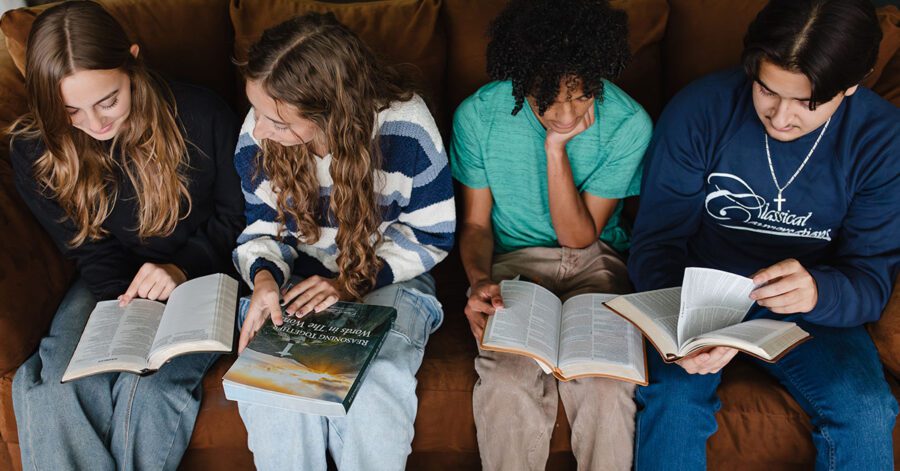God is a master storyteller. And we are characters in the Master’s story. Our responsibility lies in being one of the good guys and fulfilling our role in moving the story forward…to wear the white hat and fight for justice, that is our job.
The story begins a long time ago, when God created this world. Here is where I diverge from the opinions of my learned opponents. An old earth—one in which God spent billions and billions of years building a home for us where we might spend a fraction of that time living out the actual story—makes for an awkward story. This is not the narrative of a master storyteller. But I digress.
So God builds a home and then puts people in it. He names that first couple Adam and Eve. Adam gets the job of naming the things of this world and of ruling over them. Eve is his helper. Adam, who as a man is inclined towards utilitarian rule, is given Eve because she, as a woman, is sensitive enough to know this place needs to be beautiful, too. Together, they will take an already good world and move it from glory to glory, making it more useful and more beautiful. Or, at least they were supposed to. But we know what happens. A dragon comes along—it is always a dragon that gets between the prince and princess, isn’t it? The dragon offers Eve some fruit from a forbidden tree, and this, coupled with some verbal trickery, convinces Eve to eat it. The prince, still immature in the ways of this world, sees this happen and does nothing, other than joining her in eating the fruit. Princes are supposed to save princesses…Adam fails.
God, both storyteller and story character, gets involved. He punishes the black-hatted dragon for his deception. He chastens Adam and Eve; we know what happens: life gets harder for them. Childbearing gets harder, the ground gets harder, obedience gets harder, work gets harder—they sweat. God curses not only the players in the story, but also the home He had built for them.
From thence forward, the story is a tragedy. Murder, lying, adultery, and idolatry are all introduced. People wax wicked. God floods the whole place, punishing the wicked and saving the few righteous: Noah and his family. God starts again with them, but that just leads to the same results: idolatry at Babel. There, He has to permanently segregate people with national boundaries and with languages that are incomprehensible to one another. Then He starts again with another family: Abraham’s. That family grows into the nation of Israel, one that continuously falls into idolatry and disappointment. They fail to live up to their calling. They do not strive to move this world from glory to glory. They are not faithfully representing God to the world around them. They live in hypocrisy and idolatry, in utter unfaithfulness. There are exceptions (David, for sure), but they are exceptions that prove the rule.
We must, however, remember how the story goes. It is not just people that get worse. It is all of creation that suffers under the curse. We find, as we read through the story, that the lifespan of humans has decreased over the years after the Fall. Moreover, we find that natural disasters like earthquakes, plagues, and droughts have grown more common. Illness and disease are more rampant. All of life, and the planet we call home, suffer with us and because of us. Sin has infested everything.
Should the Storyteller have ended there, He would have written an amazing tragedy. The hero, man, begins in a world of perfection, falls from it, brings pain and misery upon himself, his progeny, and the creation he was to rule over. There are twists and turns throughout, those in which you are muddled by the incessant making of bad decisions, and others in which you are rooting for them to finally pull out of the mess and set things aright. But in the end, it is a tragedy.
The story is a tragedy, that is, until Christmas comes. With Christmas comes the Prince—the Prince who would save His Princess and restore the world given to her. With Christmas comes the beginning of everything being put right again. No more is humanity permanently and perpetually enslaved to sin. The Prince will free it. No more is evil and sin ruling over this world, but He rules from His throne at the right hand of the Father. No more does the cursed earth make the beasts that crawl upon it unclean…even now we see that we may eat what was previously forbidden. The curse is being lifted. And just as the first prince had a princess to help him beautify the world, so too does our Prince have a Princess who is here to help him beautify the world. So for us and through us, His enemies are continually put down and His people and His creation are renewed.
The tragedy is become a comedy* because Jesus Christ, the Prince of Peace, is ruling and reigning over His kingdom, defeating the kingdoms of this world, and doing so until every knee bows and every tongue confesses His lordship. He does this for us, He does this for Himself, and He does this for His Father. And His Princess will see, through history, this happening before her very eyes, and will give Him all glory, praise, and honor for it.
Christmas makes a comedy.
*Comedy – a dramatic work in which the central motif is the triumph over adverse circumstance, resulting in a successful or happy conclusion. (www.dictionary.com)




